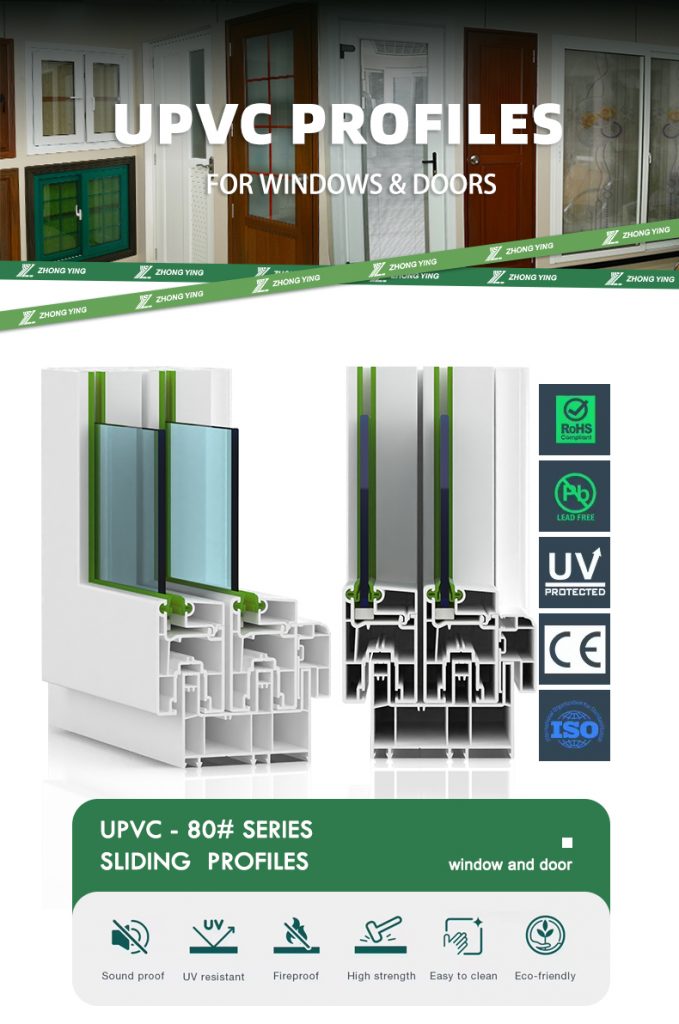Choosing the right windows and doors is one of the most important decisions in construction and renovation. They not only affect the appearance of a property but also determine energy efficiency, durability, and security. Two of the most popular materials on the market are UPVC windows and doors and aluminum windows and doors.
Each has unique advantages and limitations, and the right choice often depends on your budget, location, and design goals. In this article, we will compare UPVC and aluminum in terms of performance, style, and cost to help you make the best decision.
Material Overview
- UPVC (Unplasticized Polyvinyl Chloride)
UPVC is a type of rigid plastic commonly used for windows and doors. It is valued for being affordable, low-maintenance, and excellent at insulation. - Aluminum
Aluminum is a lightweight metal known for its strength and sleek appearance. Modern designs often use thermal break aluminum profiles to improve insulation and energy efficiency.
Durability and Lifespan
- UPVC Windows and Doors
UPVC is resistant to rust, corrosion, and weather damage. However, it may discolor slightly over decades and is not as strong as aluminum for very large openings. Typical lifespan: 20–30 years. - Aluminum Windows and Doors
Aluminum is incredibly durable, withstanding harsh weather and heavy use. It does not warp or rot and maintains its appearance for decades. Typical lifespan: 30–50 years.
Winner: Aluminum for strength and longevity.
Energy Efficiency
- UPVC
UPVC frames are naturally insulating. When combined with double glazed windows, they offer excellent thermal performance, keeping homes warm in winter and cool in summer. - Aluminum
Traditional aluminum conducts heat easily, but modern thermal break aluminum windows have improved dramatically. Still, they usually perform slightly below UPVC in insulation.
Winner: UPVC for natural energy efficiency.
Aesthetics and Design
- UPVC
UPVC windows and doors come in many finishes, including wood-effect designs. Options like UPVC sash windows or flush UPVC windows work well in traditional homes. However, UPVC frames are generally thicker than aluminum. - Aluminum
Aluminum allows for slim frames and larger glass panes, making it perfect for sliding doors, bi-fold doors, and curtain walls. It is the preferred choice for modern, minimalist architecture.
Winner: Aluminum for modern design flexibility.
Cost Comparison
- UPVC
UPVC is significantly cheaper to produce and install. Options like cheap UPVC windows or PVC doors for sale are widely available, making it ideal for budget-conscious homeowners or large housing projects. - Aluminum
Aluminum products, especially thermal break aluminum profiles, are more expensive upfront. However, their durability may offset long-term costs.
Winner: UPVC for affordability.
Maintenance
- UPVC
Requires minimal care—occasional cleaning and lubrication of hinges are enough. - Aluminum
Also low-maintenance, but the tracks of aluminum sliding doors need regular cleaning to avoid dust buildup. Powder-coated finishes are highly resistant to scratches and fading.
Winner: Tie—both are easy to maintain.
Security
- UPVC
Modern UPVC front doors and windows come with multipoint locking systems, offering solid security. - Aluminum
Due to its natural strength, aluminum frames are harder to break or damage. They are often chosen for commercial buildings and luxury homes requiring top security.
Winner: Aluminum for strength.
Best Applications
- UPVC Windows and Doors
- Ideal for residential properties.
- Best for moderate climates.
- Suitable for homeowners seeking affordable, energy-efficient solutions.
- Examples: UPVC French doors with side windows, UPVC conservatory doors.
- Aluminum Windows and Doors
- Perfect for commercial buildings and luxury homes.
- Best for modern architecture requiring slim frames and wide glass surfaces.
- Suitable for areas with extreme weather.
- Examples: aluminum sliding doors, aluminum casement windows, curtain walls.
Final Verdict: UPVC vs Aluminum
There is no single “best” option—it depends on your needs:
- Choose UPVC windows and doors if you want affordable, energy-efficient, and low-maintenance solutions.
- Choose aluminum windows and doors if you value strength, slim profiles, and modern aesthetics, and are willing to invest more upfront.
For many homeowners, a combination works best—for example, using UPVC double glazed windows in bedrooms for insulation and aluminum sliding doors in living areas for style and openness.
Conclusion
Both UPVC and aluminum offer excellent options for modern homes and buildings. UPVC excels in affordability and insulation, while aluminum leads in durability and design flexibility. Whether you are planning a small renovation or a large commercial project, understanding the differences between UPVC and aluminum doors and windows will help you make a smart, long-lasting choice.
By balancing cost, style, and performance, you can select the perfect solution that enhances comfort, security, and energy efficiency in your property.
